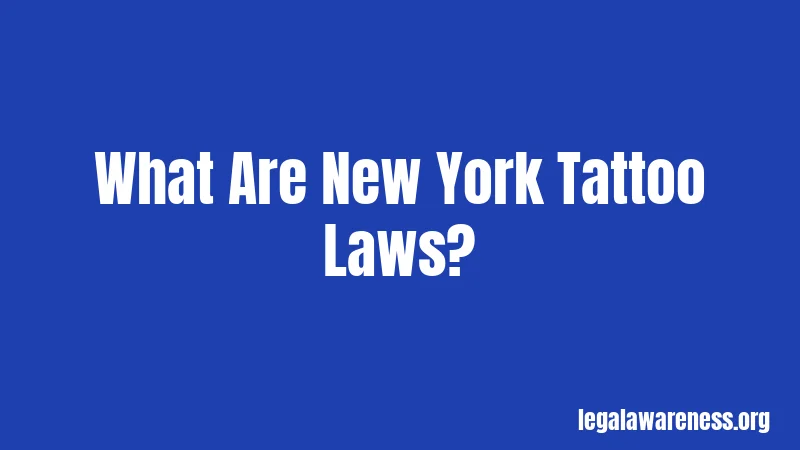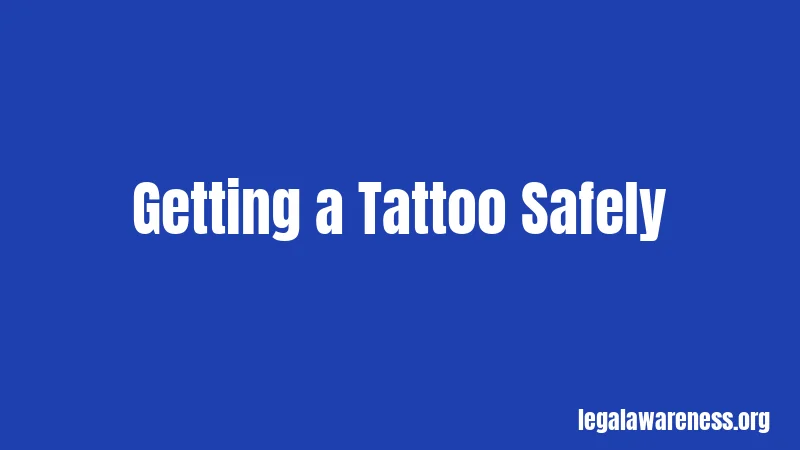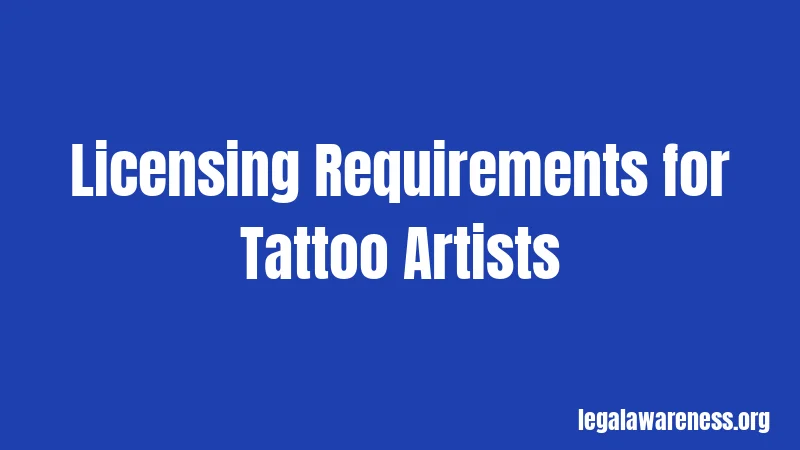Tattoo Laws in New York (2026): The Complete Guide
Most people have no idea how strict New York’s tattoo laws actually are. Seriously. You might think getting a tattoo is just a personal choice. But in New York, there are specific rules about who can get inked, who can do the inking, and what kind of setup they need to use.
This guide breaks down everything you need to know. Whether you’re thinking about getting your first tattoo or you run a tattoo shop, these laws matter. Let’s dive in.
What Are New York Tattoo Laws?

Think of tattoo laws as the government’s way of protecting your health and safety. New York regulates tattoos pretty carefully. The state wants to make sure tattoo artists are trained properly and their shops are sanitary.
Here’s the basic idea: You can get a tattoo in New York. But it has to be done by a licensed professional in a regulated facility. Pretty straightforward, right?
Age Requirements
Okay, let’s start with the most important rule. You must be at least 18 years old to get a tattoo in New York. No exceptions here.
If you’re under 18, you cannot get a tattoo. Not even with parental permission. Not even with a parent standing right there. The law is pretty clear on this one.
Now, if a tattoo artist gives a tattoo to someone under 18, that’s a serious problem. We’ll talk about the penalties later. But this is literally the first rule tattoo shops need to follow.
Getting a Tattoo Safely

Want to know what separates a legal shop from an illegal one? Let me break it down for you.
First, the artist has to be licensed. In New York, tattoo artists need proper training and credentials. They can’t just decide to start tattooing people one day. It doesn’t work that way.
Second, the shop needs to meet health standards. We’re talking about cleanliness, sterilization equipment, and proper disposal of needles and other materials. These aren’t suggestions. They’re required by law.
Third, the artist has to use sterile, single-use needles for each client. This prevents the spread of serious infections and diseases. Every needle that touches your skin should come out of a sealed package.
Sound complicated? It’s actually about protecting you. The rules exist because tattoos involve breaking the skin. That means infection risk is real.
Health and Sanitation Standards
Here’s where things get specific. New York has detailed rules about how tattoo shops must operate. Licensed tattoo establishments must follow Department of Health guidelines.
The shop needs proper lighting. The work area must be clean and disinfected between every single client. We’re talking about thorough cleaning protocols, not just a quick wipe down.
All instruments that touch your skin must be sterilized in an autoclave. That’s a special machine that uses heat and pressure to kill all bacteria and viruses. Nothing gets reused without going through this process.
The shop also needs proper disposal containers for needles and other contaminated materials. Sharps can’t just go in the regular trash. They go in special red containers that get picked up by medical waste companies.
Not sure if a shop meets these standards? Ask to see their license. Legitimate shops are proud to show it. They have nothing to hide.
Licensing Requirements for Tattoo Artists

Let’s talk about the people doing the work. Tattoo artists in New York need proper credentials.
To become a licensed tattoo artist in New York, you typically need to complete an apprenticeship. This usually takes several years. The apprenticeship teaches you sterilization procedures, anatomy, design principles, and health regulations.
After your apprenticeship, you need to pass an exam. This exam covers health and safety knowledge. You also need to demonstrate competence in tattoo application techniques.
Some artists have formal training from tattoo schools in addition to apprenticeships. The state recognizes both paths. The key is that you’ve learned the proper procedures.
Once licensed, artists need to renew their credentials periodically. They also need to stay updated on health regulations and best practices. It’s an ongoing commitment, not a one-time thing.
What You Can and Cannot Tattoo
Wondering if there are limits on what tattoos you can get? Actually, yes.
New York doesn’t allow tattoos on certain parts of the body. You cannot get a tattoo on your face or neck as your first tattoo. This protects younger clients who might make impulsive decisions they later regret.
Wait, hold on. Let me clarify that. Some shops have their own policies about face and neck tattoos. But state law focuses mainly on age-related restrictions and sanitation.
The bigger restriction is about the content. Tattoos that are offensive, hateful, or promote illegal activity are problems. Most reputable artists won’t do these anyway.
Some areas have local regulations too. New York City might have different rules than upstate areas. Always check with your local city or county for any additional restrictions.
Penalties for Breaking Tattoo Laws
Okay, this is where it gets serious. If someone breaks New York’s tattoo laws, consequences follow.
An unlicensed tattoo artist can face fines. The amount depends on how severe the violation is. First-time violations can result in fines up to several thousand dollars.
For repeat violations, the penalties get worse. You could face higher fines and even jail time. We’re talking misdemeanor charges, which go on your criminal record.
If an artist tattooes a minor, that’s even more serious. This is considered a crime. Penalties can include substantial fines and potential jail time.
Operating an unsanitary shop is also illegal. Health violations can result in the shop being shut down immediately. Fines and criminal charges follow.
Honestly, this is the part most people miss. They think tattoo laws are minor. They’re actually not. Breaking these laws can seriously impact your life.
Operating a Tattoo Shop
If you run or want to run a tattoo shop in New York, pay attention here.
Your shop needs a business license and a tattoo establishment license. These are two different things. You need both to operate legally.
You must comply with all Department of Health regulations. This means regular inspections. Health inspectors visit shops to make sure everything meets standards.
Your staff needs to be licensed tattoo artists. You can’t have helpers doing tattoos without proper licensing. Every person applying ink needs credentials.
You also need proper insurance. Health insurance for your employees is important. Liability insurance protects you if something goes wrong.
Keep detailed records of every client. Document their age, consent, and the date of service. These records protect you legally.
Consent and Legal Responsibility
Here’s something people often overlook. When you get a tattoo, you’re signing away certain rights.
Most shops require you to sign a consent form. This form says you understand the risks. It confirms you’re getting the tattoo by choice.
The artist is not responsible for infections that happen because you didn’t follow aftercare instructions. That’s on you. They are responsible for using sterile equipment and proper technique.
If an artist violates health codes and causes an infection, that’s their problem. That’s why those regulations exist. They protect both the artist and the client.
Make sure you understand what you’re signing. Read the consent form carefully. Ask questions if anything seems unclear.
Aftercare and Your Responsibility
Getting the tattoo is just the beginning. What you do after matters just as much.
Follow your artist’s aftercare instructions. This usually means keeping the area clean and dry for a few days. Don’t soak it in water or expose it to dirt.
Use the recommended products. Most artists suggest specific ointments or moisturizers. Use what they recommend, not whatever’s in your medicine cabinet.
Avoid sun exposure during the healing period. Don’t scratch or pick at the tattoo. Let it heal naturally.
If you notice signs of infection, see a doctor immediately. We’re talking about excessive redness, warmth, pus, or fever. These aren’t normal. Get medical attention right away.
This is one area where the law puts responsibility on you. Take it seriously. Proper aftercare prevents most problems.
Reporting Illegal Tattoo Operations
Spotted an illegal tattoo shop? Concerned about an unlicensed artist? You can report it.
Contact your local health department. They handle tattoo shop complaints. Most places have an online form or phone number.
You can also report to your city or county government office. They coordinate with health authorities.
When you report, provide details. What shop is it? What specifically concerns you? The more information you give, the easier it is to investigate.
Don’t worry about being identified. These complaints are often confidential. The agency investigates based on what you report.
Changes to New York Tattoo Laws
New York updates its tattoo regulations periodically. Recent years have seen stricter enforcement of existing rules. The state takes sanitation and age restrictions very seriously.
As of 2026, the basic framework remains the same. You must be 18. Artists must be licensed. Shops must meet health standards.
However, some local jurisdictions have added their own rules. New York City, for example, has additional requirements for tattoo shops. Always check your specific city or county for updates.
The state continues to monitor tattoo industry practices. If new health risks emerge, rules can change. Stay informed about any updates in your area.
Tattoos and Employment
Here’s something worth considering. Getting a visible tattoo can affect your job prospects. It’s not illegal for employers to judge based on tattoos, unfortunately.
Some employers have strict policies against visible tattoos. Others are fine with them. This varies widely by industry and company.
Think about this before you get inked. Where you place a tattoo matters. A tattoo on your forearm might be visible at work.
The law doesn’t protect you from employment discrimination based on tattoos. That’s a personal decision you need to make. Just go in with your eyes open.
Removal and Cover-ups
Changed your mind about a tattoo? You have options.
Tattoo removal is legal and available. Several methods exist, including laser removal. These procedures work but can be expensive and take time.
Cover-ups are another option. A skilled artist can design a new tattoo over your old one. This often works well if the original tattoo is smaller.
Removal and cover-ups aren’t regulated the same way as getting new tattoos. But reputable artists apply the same health standards. Make sure wherever you go follows proper sanitation practices.
Special Considerations for Minors
If you’re a young person thinking about tattoos, pay attention here.
You cannot get a tattoo legally until you’re 18. This is absolute. There’s no way around it.
Some people try to get tattoos from unregulated artists. This is dangerous. Unregulated artists don’t follow safety standards. You risk serious infections or permanent damage.
Wait until you’re 18. Use that time to think carefully about what you really want. Tattoos are permanent. Make sure you’re certain before you commit.
Frequently Asked Questions
Can I get a tattoo at 17 if my parents give permission? No. The law requires you to be 18. Parental permission doesn’t change this. Wait until your 18th birthday.
What should I look for in a legitimate tattoo shop? Ask to see the shop’s license and artist credentials. Check that the space is clean. Ask about sterilization procedures. Reputable shops are happy to answer these questions.
If a tattoo artist gave me a tattoo without proper sterilization, what should I do? See a doctor immediately. Document what happened. You may want to consult with a lawyer about your options.
Are there any New York cities with different tattoo laws? New York City has additional regulations beyond state law. Always check your specific city or county for local requirements.
How old do I need to be to work in a tattoo shop as an apprentice? Apprenticeship requirements vary. Check with your local health department for specific age and training requirements in your area.
Final Thoughts
Here’s what you need to remember. New York takes tattoo safety seriously. The laws exist to protect your health and ensure quality work.
Before you get a tattoo, visit the shop in person. Look around. Ask questions. Legitimate businesses welcome your questions.
If you’re planning to become a tattoo artist, commit to proper training and licensing. The apprenticeship takes time. But it’s worth it.
Respect these laws. They’re not just bureaucratic rules. They actually protect you from real health risks.
Stay informed. Stay safe. And when in doubt about whether a shop or artist is legitimate, ask your local health department. They’re your best resource.
References
New York State Department of Health: Tattoo Establishment Guidelines
New York State Public Health Law, Article 25-D: Tattoo Establishments
New York City Department of Health and Mental Hygiene: Tattoo Shop Requirements
Occupational Safety and Health Administration (OSHA): Bloodborne Pathogen Standards
Centers for Disease Control and Prevention: Tattoo Safety Information
